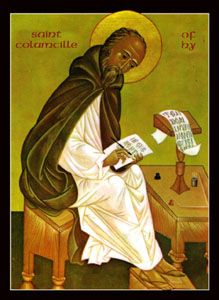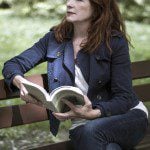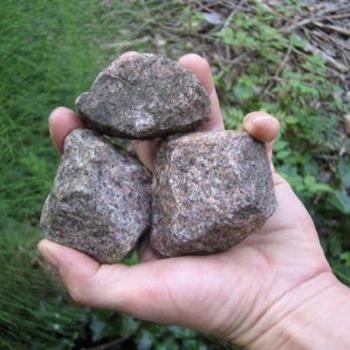Two weeks ago, I wrote about the pilgrimage that I’m taking with my kids. When I finished that reflection, I recognized a tension in my mind about the very idea of a pilgrimage. Too often, going on a spiritual journey gets attached to the whole notion of “self discovery” or with that old cliche that being a pilgrim is “about the journey and not the destination.”
This attitude smacks of the New Age Angelism that Walker Percy lampooned in Lost in the Cosmos. I know myself very well, and I’m a wreck. My heart is treacherous and a wanton tart. The self I discover, on a daily basis, is not someone I really want to get to know. And I certainly don’t want to “embrace my dark side” in the way that many New Age practitioners advocate. I want to run like hell. I want to be changed and transformed. If I got on a spiritual journey, I want to know that I’m not getting lost in the skubula that oozes from the fractures of my own heart.
Still, I don’t want to be Matt Walshian and make fun of deep, spiritual reflection that doesn’t provide easy answers. I realize that pilgrimages don’t always bring the wisdom we sought at the beginning. A journey taken for spiritual reflection isn’t something that can be measured by a Fit Bit for the soul. In our quantified culture, obsessed with tracking and data, everything is measured in worth by what contributes to a final “Goal” instead of seeing something’s inherent holy worth.
Further, I find the idea of aimless wandering without a home or destination to be spiritually and physically exhausting. It’s my belief that people who pontificate about the journey being the point actually have cozy fires and a cozy family around them. As I examine my own life, I realize that I never felt “cozy” anywhere that wasn’t the Catholic Church. My whole life I’ve been searching for a home where I could let my guard down and feel at peace.
When I was in sixth grade, my parents moved us to St. Louis and left the Catholic Church. Everything I took comfort in was wrenched out of whack and I never felt at home again. The obsessive desire for that comforting, homey place turned my personal life into an utter disaster and caused deep emotional wounds. I often feel like I’m floating away into the atmosphere with no possibility of reentry. And now that I live away from my kids, the feeling of floating away has increased. I need something sacramental to ground me in reality.
And yet, the other half of me is prone to wander. Lord I feel it. I love to explore, knock around hidden corners and go on long journeys. I can’t sit still for very long. That part of me wants to go, go and go. Even at work, I have to get up and walk around the building, even if it’s just for five minutes. There is a restless, feral part of my soul. And, when managed, it’s not always a bad thing.
So, then, how is a good pilgrim supposed to prepare for the journey if a goal-oriented approach destroys the soul and an ethereal “no guidelines” mentality untethers the body from the soul? How can this tension be resolved? Even more, how can I take a pilgrimage and avoid making it a “journey of self discovery?” What would that offer my kids?
As I reflected on this, I recalled the words of one my seminary professors when we were discussing the Hebrew language as we contemplated the Psalms. Dr. Jack Collins is one of the smartest men I know. And, though he is a Protestant, he said something that, I think , began my journey to the Catholic church. Jack said, “Listen, you all need to think like Jews, and stop thinking in either/or categories. Sometimes, things are both/and. Accept it.”
Both/and–what a beautiful concept. It embraces the idea that two seemingly contradictory ideas can be simultaneously true. Not always, but sometimes. The Catholic Church has been a place where I’ve been able to embrace holding things in tension. This idea of “both/and” helps me understand the two sides of a pilgrimage.
That is, I can enjoy the idea of wanting a destination, answers, and a home at the end of the road. Because, as a Christian, those ideas are promised to me. I don’t have to worry about getting lost in my own head and wandering off into the wilderness where the darkness awaits, ready to stuff me into its pie hole.
I can also embrace that the journey is how I prepare to come home. I can stop and discover the lessons God wants me to learn. And more, I can realize this journey is not always a nice one. It promises many dark days, weeks and even months. There are times that I’ve walked forward in the dark, but I learned my deepest lessons there. I can find God in places I never expected as He continues to teach as a loving Father who shows me the true nature of the world.

In other words, I can embrace the white martyrdom of the Irish monks, who cast themselves form their beloved Island with a holy intent. And maybe I can teach my kids to do the same: That is, give up something for God on a day to day basis in a way that involves total commitment.
Is this too heavy for kids? I say no. My children already know life sucks sometimes. They are vagabonds of a broken home. Even if they weren’t, I’ve seen the damage done by helicopter parenting. Instead of teaching kids to deal with the complexities and suffering of life, we’ve tried to shield them from it. I understand why. No one wants their kids to hurt, but the reality is we can’t stop it. We do them such a huge disservice by trying to blind them to the brokeness of our world. They already know it anyway.
Real life is never stable, yet that’s a lie we feed our children. And, when life knocks them on their asses, they have no tools or abilities to handle what is given to them. Then we wonder why our kids bury themselves in video games, sexting and other virtual realities. They are not prepared to embrace the white martyrdom of feeling exiled from home, wanting nothing more than to find it again, and journeying towards it with the holy intent of finding rest–someday.
So as my kids and I journey west, I want to teach them to live in their discontent, in their wanting to be home. It’s a holy desire and a holy goal.
But I also want them to know that it’s in the journey that we prepare to live in the homes that God has waiting for us at the end. Every pilgrimage is just a micro-picture of the great one we’re all making.
I don’t know about you, but home sounds pretty damn good after a long and dangerous journey.













